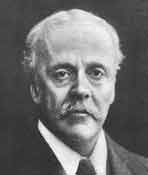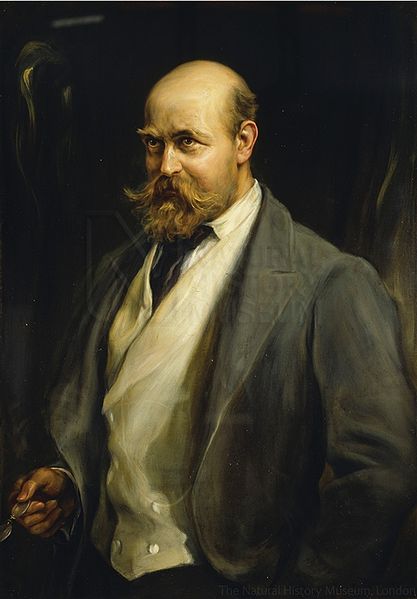History of the Balfour Declaration
 |
 |
|
Lord Balfour
|
Lord Rothschild
|
Who Gets the Credit?
Nahum Sokolow’s Diplomacy
Palestine is Divided
International Recognition
On November 2, 1917, British Foreign Secretary Lord Arthur James Balfour wrote a letter to Lord Walter Rothschild. The contents of this letter became known as the Balfour Declaration:
Why did Britain issue the declaration?
The answer is the subject to debate. One argument is that the British wanted to reward the Zionist leader most active in lobbying for a declaration, Chaim Weizmann, because of his invention of a process for producing acetone, which was used in the manufacture of explosives critical to the Allied war effort in World War I.
A second explanation is that the British desperately needed the United States to enter the war and some officials had an essentially anti-Semitic view that American Jews had a great deal of influence with the government and would rally support for England. They calculated that support for a Jewish home would make those Jews happy and encourage them to lobby the government to join the war against Germany and its allies. Some also feared that Germany would act first and make its own pro-Zionist declaration. Historian Tom Segev suggested that Weizmann might have exploited this attitude: “For once, the anti-Semitic image of the Jews proved useful – they were believed to be so maliciously dangerous that one would do best to acquire them as allies rather than as enemies.”
Segev suggests a third reason for British sympathy toward Zionism. He argues that, as religious Christians, Britain’s leaders, including Prime Minister David Lloyd George and Lord Balfour, admired the Jews and believed the Holy Land was their spiritual home. “Modern Zionism, they believed, would fulfill a divine promise and resettle the Jews in the land of their ancient fathers.”
A fourth reason Britain may have embraced Zionism was to justify its entitlement to Palestine when it came time to divide the spoils of war. By positioning themselves as the promotors of a Jewish homeland they could rationalize the superiority of their claim to Palestine over the French.
According to historian Benny Morris, Balfour said “he had been motivated by a desire to do something for the Jews, because they had suffered greatly at the hands of the Christian world during the previous 1,900 years and because of the values and norms, including monotheism and the notions of social justice, that they had bestowed on humankind through the Old Testament.”
Who Gets the Credit?
Ze’ev Jabotinsky was among those who credited Weizmann for his role:
As early as 1914, Weizmann had concluded the Allies would win the war and hoped that Palestine would fall within England’s sphere of influence because the British were more likely to support the Zionists and Jewish settlement there. Weizmann met with Prime Minister Lloyd George and Herbert Samuel and told the editor of the Manchester Guardian that Samuel had spoken about a plan to establish a Jewish community in Palestine under the British protectorate.
Nahum Sokolow’s Diplomacy
Historian Martin Kramer argues that another Zionist leader, Nahum Sokolow, may deserve more credit than Weizmann. “He accomplished what many thought impossible,” according to Kramer. “During the spring of 1917, he secured the explicit or tacit assent of the French and Italian governments, and even of the Catholic pope, to a Jewish ‘national home’ under British auspices.”
Kramer also answers the question as to why the Zionists focused their lobbying on Britain. He said they were convinced their best hope for support came from the British because it was the only country in Europe where they had significant influence among key officials. Britain was also the only country that had the “mix of strategic interests, military power, and political will to enforce its writ in Palestine.”
In 1916, however, the Zionists had a problem, though they did not know it. The British and French had already planned to divide up Palestine in the Sykes-Picot Agreement. The Zionists got a break, however, when David Lloyd George became prime minister of Britain and decided the deal should be revised to give Britain control over more of Palestine. Sir Mark Sykes subsequently met with leaders of the Zionist movement, including Sokolow and Weizmann, and told them Britain might offer some form of recognition if they could overcome French opposition to a foothold in Palestine. Sokolow was chosen to represent the Zionists in a meeting with François Georges-Picot.
Sokolow held a series of talks with Picot in London and other officials in Paris, including Prime Minister Alexandre Ribot. Sokolow tried various arguments, suggesting the Zionists preferred British protection and that backing the Zionist cause would win support from Jews in Russia and the United States. After the French expressed sympathy, Sokolow asked for a statement in writing. On June 4, 1917, Jules Cambon, secretary-general of the foreign ministry wrote a letter to Sokolow that stated:
The language in this letter is stronger than what Balfour later wrote as it speaks of the “justice” of the Zionist cause and acknowledges the historical Jewish connection to the land. It also omitted any mention to the rights of non-Jews. By obtaining French support, Sokolow had made it difficult for the British to do any less.
The French also urged Sokolow to seek the support of the Catholic Church. This was a seemingly hopeless idea since Pope Pius X had told Theodor Herzl in 1904 that “the Jews have not recognized our Lord, therefore we cannot recognize the Jewish people.” Pope Benedict XV, however, told Sokolow the return of the Jews to Palestine was “providential; God has willed it.” They exchanged vows to respect the rights of Jews and Catholics to their holy places eliminating a possible major source of opposition to the Zionist enterprise. The Italian government added its support, allowing Sokolow to return to London with the unexpected backing of two of Britain’s war allies.
Sokolow had also cultivated a key ally in the United States, Louis Brandeis, who lobbied for support of the draft of the Balfour Declaration. Despite widespread hostility toward Zionism, President Woodrow Wilson decided in October 1917 he would endorse the language though he did make his views public until August 1918 in a letter to Stephen Wise.
Without the support of the French and Americans it is unlikely the opposition of British anti-Zionists to any expression of support for a Jewish homeland could have been surmounted. Once the Balfour Declaration was announced, Sokolow and his colleagues succeeded in securing endorsements from France, Italy, Japan, China, Siam and the United States.
The decisive cabinet meeting to discuss the future of post-Ottoman Palestine was held on October 31, 1917. Weizmann, and the head of the NILI Jewish intelligence organization, Aaron Aaronsohn, were invited to be present in the anteroom. When Sykes emerged from the meeting, he announced, “It’s a boy,” and Weizmann and Aaronsohn were invited to shake hands with Prime Minister George, Foreign Minister Balfour, and other cabinet ministers.
Palestine is Divided
Zionist celebrations following the issuance of the Balfour Declaration proved premature. In 1921, Colonial Secretary Winston Churchill severed nearly four-fifths of Palestine — some 35,000 square miles — to create a brand new Arab entity, Transjordan. This was a betrayal of Balfour as acknowledged by the Peel Commission, appointed by the British Government to investigate the cause of the 1936 Arab riots. The commission wrote that the field in which the Jewish National Home was to be established was understood, at the time of the Balfour Declaration, to be the whole of historic Palestine, including Transjordan. The Zionists had no recourse and had to focus their attention on ensuring the international community would endorse the concept of a Jewish national home.
In 1921, the British also convened meetings in Cairo and Jerusalem to resolve the conflicting policies defined in the Hussein-McMahon letters (1915), the Sykes-Picot agreement (1916) and the Balfour Declaration (1917). During the conference, it was agreed that Lebanon and Syria should remain under French control and that Britain should maintain the mandate over Palestine and continue to support the establishment of a Jewish Homeland there. The British also made the crowning of Abdullah bin Hussein as ruler of Transjordan conditional on his acceptance of a Jewish national home within western Palestine and rejected his demand for control over Palestine. T.E. Lawrence, then an advisor to Churchill, also secured a pledge from Abdullah’s brother Faisal that “all necessary measures” would be taken “to encourage and stimulate immigration of Jews into Palestine on a large scale.”
Churchill also met with an Arab delegation that protested the Balfour Declaration, the appointment of a Jew (Herbert Samuel) as High Commissioner for Palestine and the draft Mandate for Palestine. Churchill responded that the Balfour Declaration had been ratified by the Allied Powers and was an established fact. He added, the national home for the Jews would be “good for the world, good for the Jews and good for the British Empire ... good for the Arabs who dwell in Palestine.” He said that Palestine would remain the home of people beside Jews and that Britain had no intention of setting up a Jewish government to dominate the Arabs. Churchill also defended the appointment of Samuel, which he said was based on his training and experience.
International Recognition
The British had no right to determine the future of Palestine; however, the League of Nations gave the Balfour Declaration international legitimacy when it was incorporated in the Mandate for Palestine, which specifically referred to the historical connections of the Jewish people with Palestine and to the moral validity of reconstituting their National Home in that country. The term reconstituting shows recognition of the fact that Palestine had been the Jews’ home. Furthermore, the British were instructed to use their best endeavors to facilitate Jewish immigration, to encourage settlement on the land and to secure the Jewish National Home. The word Arab does not appear in the Mandatory award. The Mandate was formalized by the 52 governments at the League of Nations on July 24, 1922.
The United States was not a member of the League; however, the U.S. Congress adopted a resolution endorsing the Balfour Declaration on September 21, 1922, which was signed by President Warren Harding. President Herbert Hoover reiterated America’s support in 1932 as did President Franklin Roosevelt in 1937.
In April 2017, the British government rejected a Palestinian request to apologize for the Balfour Declaration:
Kramer summarizes the importance of the Balfour Declaration:
Sources: Martin Kramer, “The Forgotten Truth about the Balfour Declaration,” Mosaic, (June 5, 2017);
“British government rejects Palestinian request to apologize for Balfour Declaration,” JTA, (April 25, 2017).
Tom Segev, “‘View With Favor,’” New York Times, (August, 20, 2010);
Azriel Bermant, “Chaim Weizmann, the Guardian and the Balfour Declaration,” Fathom, (Summer 2017);
Efraim Halevy, “‘Mack’: Aaron Aaronsohn, the NILI intelligence network and the Balfour Declaration,” Fathom, (Sumer 2017);
“Cairo Conference (1921), Wikipedia;
Benny Morris, “The War on History,” Jewish Review of Books, (Spring 2020).


